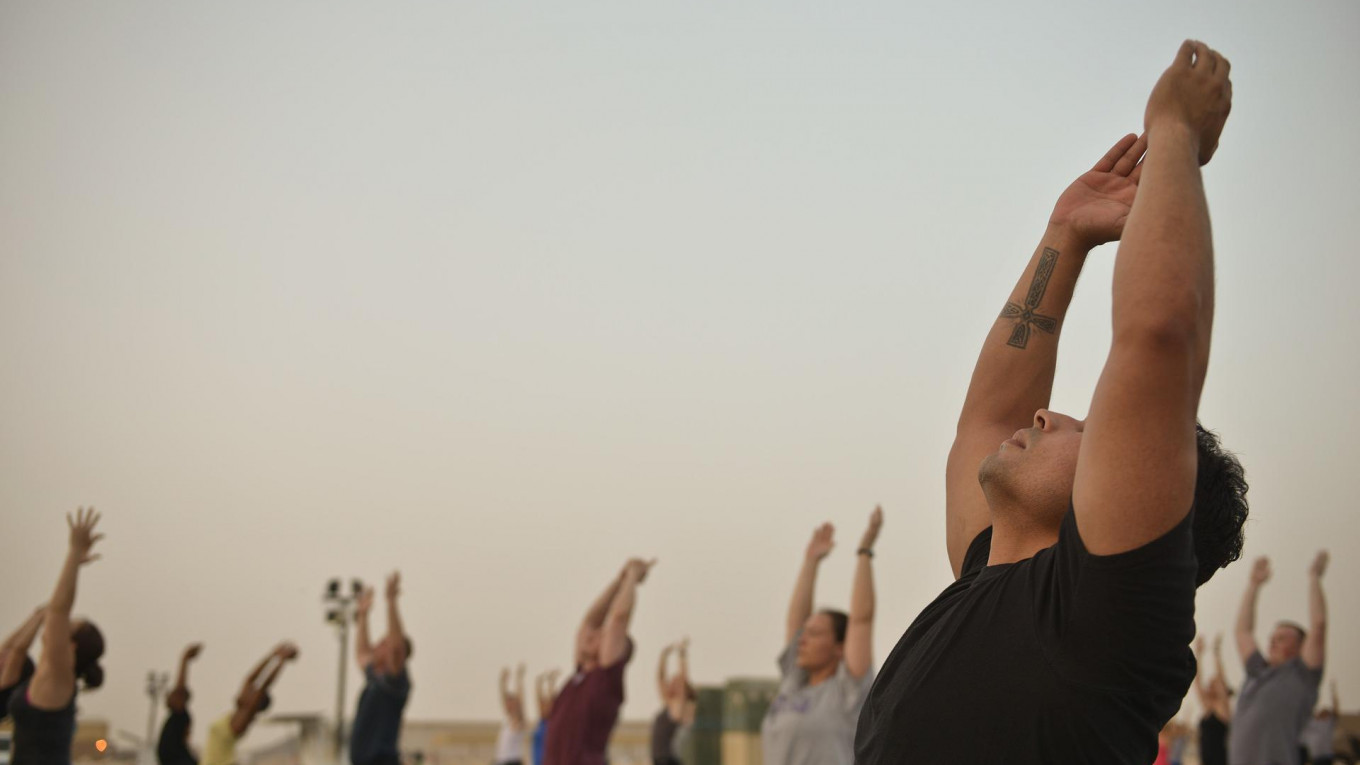People have joked about a yoga ban in Russia ever since a West Siberian city flirted with the idea in July 2015, when several studios in town received letters from the local government, asking them to stop holding yoga classes in municipal buildings. The city described it as an effort against “new religious cults and movements.”
Nizhnevartovsk soon rescinded the requests, disciplining the officials responsible for mailing out letters with “incorrect information.”
The story was made all the stranger when, a week later, while meeting with Indian Prime Minister Narendra Modi, Vladimir Putin expressed admiration for yoga and even promised to give it a shot. “I have tried many things, though never yoga, but it cannot fail to attract,” Putin said.
This fall, however, yoga in Russia was back under fire. Dmitry Ugai says police detained him at a “Vedalife” festival in St. Petersburg on Oct. 22, where he lectured to a crowd about the philosophy behind yoga.
“In a sense, we can say that yoga merges with religion,” Ugai told his audience. “And in fact it’s been that way since the beginning, because the root of ‘yoga,’ which means ‘connection,’ carries the same meaning as the Latin words ‘religare’ or ‘religion,’ that is, a person who goes the way of yoga communicates with God.”
That was apparently enough to trigger the police, who Ugai says cut short his lecture, and then escorted him away from the festival to the backseat of a squad car.
“Pretty rudely, they asked me to come with them. At first, being rude and pushy, they wanted to take me away without my jacket. They were counting on intimidating me, so I couldn’t get a grip on myself,” Ugai wrote online, describing how he was detained.
Ugai says he was then held at a local police station for several hours, where he was locked up with ordinary criminals. When he was eventually interrogated, he claims officers slapped down a blank sheet of paper, and told him to sign a confession or endure another 48 hours behind bars, before going to trial. Ugai refused, but he was a free man, nevertheless, just a few hours later.
What on Earth was Dmitry Ugai’s supposed crime? Last summer, the Russian government adopted legislation that introduced a medley of so-called “anti-terrorist reforms” known in Russia as the “Yarovaya laws,” named after their chief legislative sponsor, Irina Yarovaya.
In an effort to crack down on Salafist extremism in Russia, Yarovaya’s reforms included new restrictions on “missionary activity,” amending the legal definition of the term as defined under the Russian Constitution's article on the freedom of conscience and religion. Now, missionary activity in Russia is off limits to anyone but the representatives of registered organizations and groups, and individuals who have entered into formal agreements with such bodies.
Though the legislation was designed to target jihadists in the North Caucasus, officials have been toying with other applications across Russia. In August 2016, a court in Cherkessk nearly convicted a Hare Krishna follower of illegal missionary work, after police responded to a complaint that he stood on a street corner and told two passersby about his faith.
Last month, a court in Vladivostok infamously ordered the Salvation Army to destroy 40 copies of the Bible, finding that the organization incorrectly labeled the books. It was the first time a Russian judge actually implemented the country’s new regulations on missionary activity.
Dmitry Ugai goes to court on Monday, Jan. 9, in St. Petersburg. The Moscow Times will report on his trial.
A Message from The Moscow Times:
Dear readers,
We are facing unprecedented challenges. Russia's Prosecutor General's Office has designated The Moscow Times as an "undesirable" organization, criminalizing our work and putting our staff at risk of prosecution. This follows our earlier unjust labeling as a "foreign agent."
These actions are direct attempts to silence independent journalism in Russia. The authorities claim our work "discredits the decisions of the Russian leadership." We see things differently: we strive to provide accurate, unbiased reporting on Russia.
We, the journalists of The Moscow Times, refuse to be silenced. But to continue our work, we need your help.
Your support, no matter how small, makes a world of difference. If you can, please support us monthly starting from just $2. It's quick to set up, and every contribution makes a significant impact.
By supporting The Moscow Times, you're defending open, independent journalism in the face of repression. Thank you for standing with us.
Remind me later.






